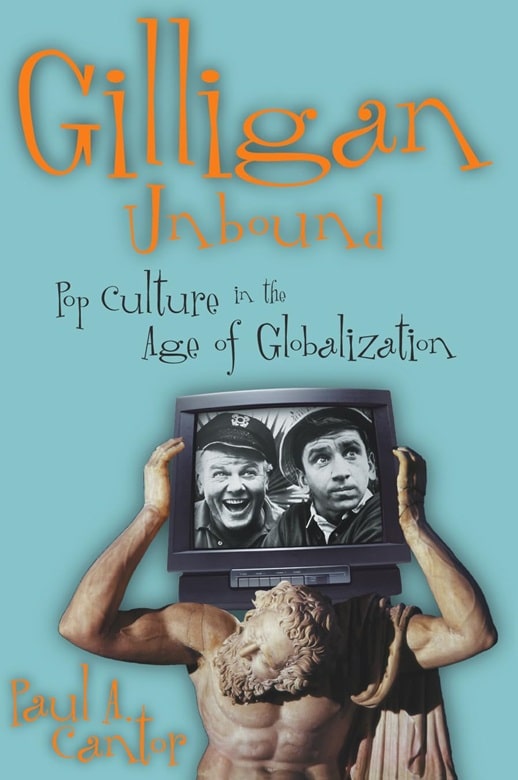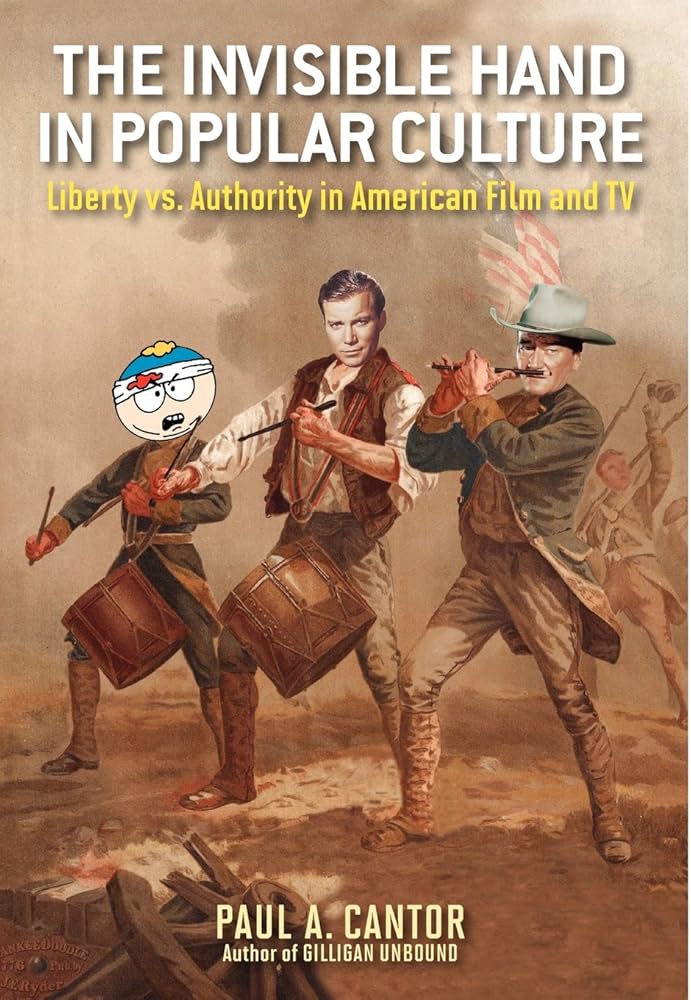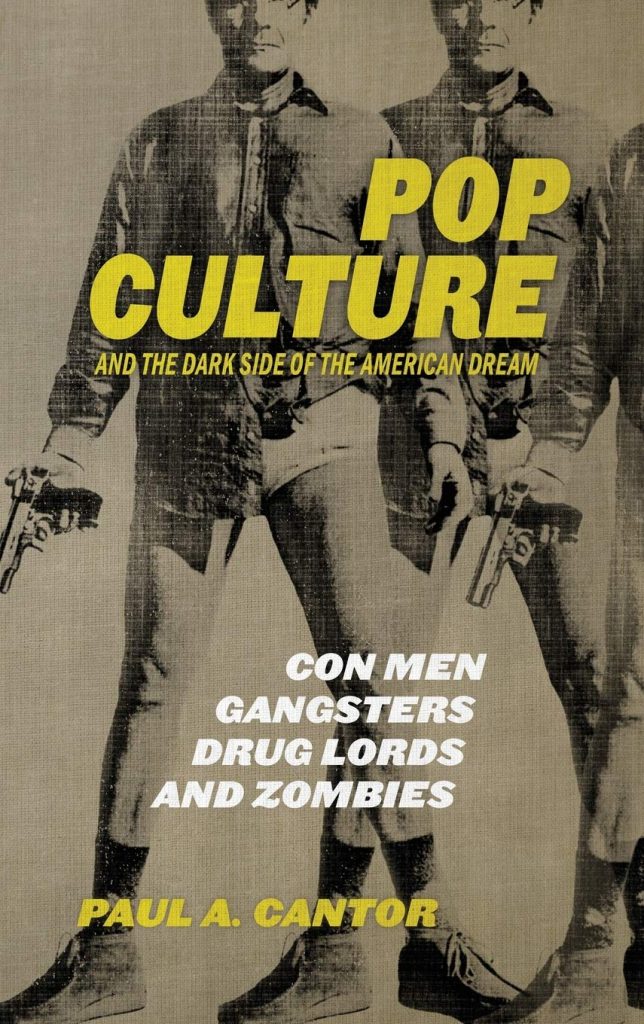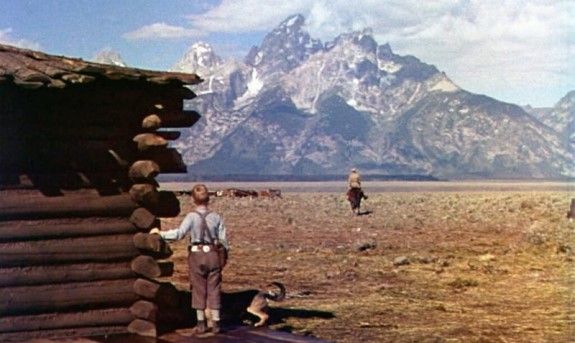Taking in the Trash: Paul Cantor’s Pop Culture Trilogy

Having just finished a very lively and thought-provoking book, I did something I almost never do — I decided to write the author a fan letter. Naturally, I hopped on Google to get his contact information, only to discover that he died almost three years ago, in February of 2022. Why do these things always happen to me?
The book I just finished, Pop Culture and the Dark Side of the American Dream: Con Men, Gangsters, Drug Lords, and Zombies was published in 2019, and is the third book in a loose cultural criticism trilogy written by Paul A. Cantor, a well-known Shakespearian scholar (Shakespeare and Rome: Republic and Empire) who was for many years a professor of English at the University of Virginia. The other volumes in the “trilogy” are Gilligan Unbound: Pop Culture in the Age of Globalization (2001) and The Invisible Hand in Popular Culture: Liberty vs. Authority in American Film and TV (2012).
Lest these footnote-laden academic-press published books with their colon-signaled subtitles sound too dry and stodgy, here is Cantor’s dedication to Gilligan Unbound:
IN MEMORY OF MY DEVOTED VCR, SONY SLV-420
July 20, 1994 — December 29, 2000
Without which this book could not have been written
Tragically, within three months of the completion of this manuscript,
the gallant machine passed away while attempting to record
eighteen hours of a Star Trek marathon on the Sci-Fi Channel
Cantor takes his generally-overlooked and much-denigrated material seriously, but not too seriously, and it’s a good thing, considering some of his subjects. Convinced that “popular” or even “trashy” genres can still tell us important things about who we are, Cantor casts a wide net — Gilligan Unbound closely examines an emblematic sitcom generally dismissed as brainless fluff (“Gilligan’s Island and the Americanization of the Globe”), TV’s quintessential science fiction show (“Star Trek and the End of History”), animated comedy (“Simpson Agonistes: Atomistic Politics, the Nuclear Family, and the Globalization of Springfield”), and contemporary political and cultural paranoia (“The X-Files and the Delegitimation of the Nation-State”).
In The Invisible Hand in Popular Culture, he tackles John Ford’s The Searchers (comparing it to Aeschylus’ Orestia), the 1950’s Western TV show Have Gun, Will Travel (which served as an apprenticeship for Gene Roddenberry — he wrote twenty four episodes for the series), Deadwood (the political philosophies of Hobbes and Locke shooting it out in the American West), Mars Attacks! (“not just a random exercise in recreating 1950’s flying saucer movies” but “a serious critique of the pro-government ideology they embodied”), Martin Scorsese’s Howard Hughes biopic The Aviator (Hughes as the embodiment of “entrepreneurial vision”), South Park (busy “reversing perspectives and inverting conventional hierarchies”), the 1934 Karloff-Lugosi Black Cat (“a fascinating case study of how Europeans looked to Americans at one moment of cultural history, and How Americans looked to Europeans”), the classic film noir Detour (a movie which “systematically deconstructs the American dream”), and The X-Files again, this time looking at it through the lens of the increased uncertainty of the post-9/11 world.
Cantor’s final pop culture book, Pop Culture and the Dark Side of the American Dream, deals with works as diverse as Huckleberry Finn (Twain is a classic now, but he began as a popular writer with a mass audience), the films of W.C. Fields (Father Never Knows Best), the epic of the American immigrant as seen in the first two Godfather movies (like most people, Cantor doesn’t have much use for Godfather III), Breaking Bad (Cantor grants this show — as he also does Deadwood — near-Shakespearian status; the chapter title is “The Macbeth of Meth: Breaking Bad and the Tragedy of Walter White”), and The Walking Dead, which he uses to examine “The Apocalyptic Strain in Popular Culture.”
All in all, the books comprise an irresistible smorgasbord for anyone who, like me, knows the name of James T. Kirk’s brother (Sam, of course), can sing both versions of the Gilligan’s Island theme unprompted, and is ready to resort to violence if anyone is reckless enough to assert that I Dream of Jeannie is better than Bewitched. (My only gripe with Cantor is that he never wrote about those two shows. Let’s see… “Domestic Magic vs. the Patriarchy: Sexual Politics and Consumer Culture on the Eve of Women’s Liberation.” Hey — it’s easy!)
No, it isn’t easy; Cantor’s scholarship is impeccable and his width of reference is breathtaking and far beyond what most writers could achieve. His juggling of high and low culture is masterful — he sees the whole drama of American self-government acted out in Deadwood and considers the show almost as profound a reflection on our country as Alexis de Tocqueville’s Democracy in America; Breaking Bad is a model of tragedy and moral ambiguity such as has rarely been seen since the Elizabethans; the genre conventions of Have Gun, Will Travel and Star Trek embody the achievements and failures of American Cold-War idealism and imperialism; the anarchism and anti-elitism of South Park hearken back to Mark Twain’s critiques of aristocracy while also prefiguring the current rampages of pissed-off populists.
The unexpectedly illuminating connections come thick and fast, but Cantor’s good-humor and obvious enjoyment of his material keep his essays from being stuffy or intimidating. (None of us are as well-read or as culturally literate as we would like to be. For myself, I’ve seen The Searchers a half-a-dozen times, but I haven’t managed to get around to the Orestia yet; it always seems to get shouldered aside by Charlie’s Angels or Fantasy Island. 2025 is the year — I promise!)
I was deeply sorry to learn of Cantor’s death (though if I had been paying attention, I wouldn’t have been all that surprised — he was 76) because I was hoping for more books like the ones I’ve enjoyed so much. There are apparently several of his essays about various television shows and similar topics that haven’t yet been collected; perhaps a posthumous volume isn’t too much to hope for. In the meantime, Cantor is all over Youtube — you can watch his entire “Shakespeare and Politics” course and listen to a plethora of conversations and interviews about his favorite subjects. But most of all, you can read his three pop culture books; they perfectly blend delight with insight, and I can’t recommend them too highly.
Oh — what was I going to write Cantor about? Mainly I was going thank him for the pleasure and stimulation that his work has given me (though I was going to — respectfully — take him to task for one aspect of his reading of Breaking Bad: I think he’s very unfair to Hank.) Then I was going to suggest a subject for an essay: the disjunction between the “received view” of American television of the 50’s and early 60’s and the more nuanced reality. (Ever notice how once a view becomes the accepted one, any evidence to the contrary tends to become literally invisible?)
The conventional view is exemplified in the 1998 movie Pleasantville, a film about which I have decidedly mixed feelings. (At the end, when Pleasantville’s citizens joyously leave their flat, black-and-white world behind and embrace multicolored reality, I turned to the friend I was watching with and said, “Now thirty percent of them have cancer.”)
In Pleasantville, the television of those long-ago postwar years is shown depicting nothing but a brainlessly optimistic, sunny, impossibly trouble-free Ozzie and Harriet/Leave It to Beaver/Father Knows Best America. (Three excellent shows, by the way, though I sometimes perversely daydream about Breaking Bad being redone with the Nelson Family.) But of course, all anyone had to do was turn the dial to be immediately immersed in a much different world, the dark realm of The Fugitive, Perry Mason, Alfred Hitchcock Presents, Peyton Place and The Twilight Zone.
There, happy, hardworking families experiencing a rising standard of living while cultivating immaculate lawns and enjoying Mom’s milk and cookies give way to murder, adultery, domestic violence, alcoholism, sexual harassment, racism, greed, embezzlement, economic inequality, fraud, cutthroat business practices, and outright miscarriages of justice. Yes, Perry Mason always won, but he couldn’t defend everyone, so how many innocent people did Hamilton Burger send to the gas chamber? And if the network had had its way Richard Kimball would never have been exonerated; in 1967 when a show was cancelled, it was cancelled; the bosses didn’t see the necessity of doing a last, wrap-up episode. That was financed entirely by the Fugitive’s creators, and if it hadn’t been for them, the wrongfully-convicted doctor would still be on the run, ducking in and out of darkened alleys and skulking around shadowy switching-yards.
I’m happy to have the fine work Paul Cantor has already given us, but I think an essay about the surprisingly dark, ambivalent portrayal of America that the tube gave us fifty years before the advent of “prestige television” would be great reading, so he should… oh… damn!
Come back, Shane — er, Paul Cantor! Please come back!
Thomas Parker is a native Southern Californian and a lifelong science fiction, fantasy, and mystery fan. When not corrupting the next generation as a fourth grade teacher, he collects Roger Corman movies, Silver Age comic books, Ace doubles, and despairing looks from his wife. His last article for us was Operatic Evil: The 1931 Dr. Jekyll and Mr. Hyde



Wow. Mr. (Dr.?) Cantor sounds like he must be the Richard Feynman of human media. Thank you for noting the additional ways of partaking of his work, beyond the books. New courses by engaging teachers are always welcome.
Enjoy Orestia.
[…] Black Gate takes a look at Paul Cantor’s Pop Culture Trilogy […]